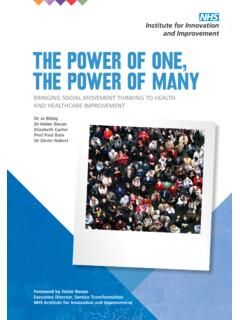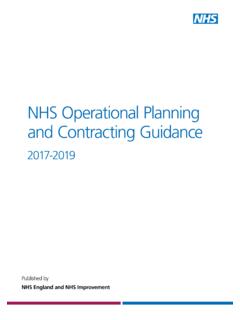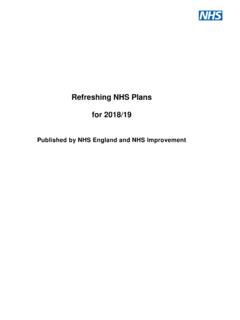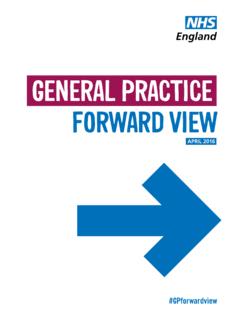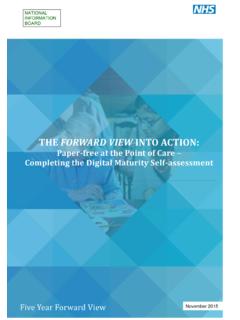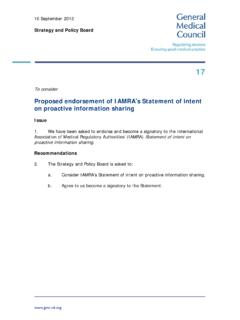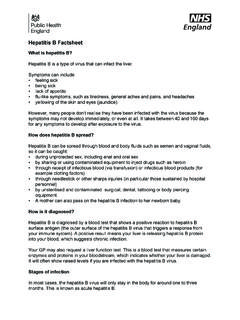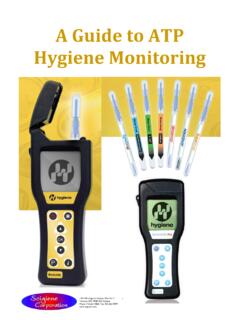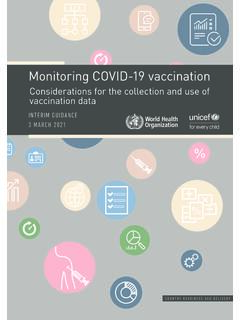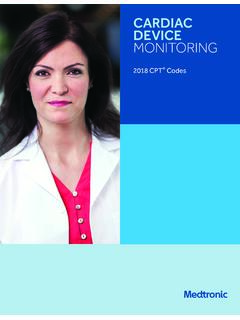Transcription of IMPLEMENTING ROUTINE OUTCOME MONITORING - NHS …
1 Gateway number: 000459 IMPLEMENTING ROUTINE OUTCOME MONITORING IN SPECIALIST PERINATAL MENTAL health SERVICESIMPLEMENTATION MANUAL FOR SPMHSR outine OUTCOME MONITORING is an important element of patient centred care and, when used fully and consistenly, enables effective treatment and high-quality services development. This manual provides tools, tips and information to help Specialist Perinatal Mental health Services (SPMHS) work through key elements of Marriott, Michelle Sleed, Kate Dalzell CORC is the UK's leading membership organisation that collects and uses evidence to enable more effective child-centred support, services and systems to improve children and young people's mental health and wellbeing.
2 CORC has over 15 years' experience in bringing together theoretical knowledge on OUTCOME measurement and relating this to the insights and expertise developed by practitioners working with children and young people on the ground. AddressThe Kantor Centre of Excellence4-8 Rodney StreetLondonN1 9 JHPhone+44 (0)20 7443 Outcomes Research Consortium (CORC)December 201902 Gateway number: 000459 TABLE OF CONTENTSFOREWORD FROM NHS ENGLAND 4 OVERVIEW 51.
3 INTRODUCTION TO ROUTINE OUTCOME MONITORING (ROM) 7 Choosing the right measure 7 Knowing when to use the measure 72. SEVEN ELEMENTS TO IMPLEMENTING ROUTINE OUTCOME MONITORING 9#1 Leadership, vision and organisational culture 10 Case Study 1: Developing an OUTCOME Framework 11#2 Embedding measures as part of the every day 12#3 Building staff confidence and capability 12#4 Practical considerations and processes 13#5 Basic IT requirements 15#6 Sustaining the effort 15#7 Analysing and reporting on aggregate data to inform service decisions 163.
4 CLINICIAN RATED OUTCOME MEASURES (CROMs) 17 Using and embedding CROMs in practice - HoNOS example 17 Tips and feedback for using clinican rated OUTCOME measures 17 Case Study 2: Scoring the HoNOS as a team 18 Case Study 3: Making the most of the HoNOS 194. PATIENT REPORTED OUTCOME MEASURES (PROMs) 20 Using and embedding PROMs in practice - CORE-10/OM example 20 Tips and feedback for using PROMs in perinatal mental health settings 23 Case Study 4: Using CORE-10 Session by Session 255.
5 PATIENT REPORTED EXPERIENCE MEASURES (PREMs) 26 Using and embedding PREMs in practice - POEM example 26 Tips and feedback for using PREMs in perinatal mental health settings 286. SPECIAL CONSIDERATIONS 29 Using measures in secondary prevention work 29 Using measures in Mother and Baby Units (MBUs) 297. ADDITIONAL MEASURES 30 Occupational Therapy 30 Parent-Infant Relationship 30 Goal Based Outcomes 31 Case Study 5: Using Goal Based Outcomes in Parent-Infant Psychotherapy 328.
6 FLOWING DATA TO NHS DIGITAL (MHSDS TECHNICAL SPECIFICATION) 33 HoNOS 33 CORE-10 349. APPENDICES 35 Appendix 1: Implementation Self-Assessment 36 Appendix 2: CORE-OM 37 Appendix 3: CORE-10 39 Appendix 4: POEM 40 REFERENCES 42 ACKNOWLEDGMENTS 4303 FOREWORDFor the mother, the family and the baby, the impact of untreated perinatal mental illnesses are beyond doubt.
7 Successive confidential enquiries into maternal deaths have shown that suicide and perinatal mental illnesses are amongst the leading causes of maternal death in the UK. Untreated perinatal mental illnesses may not only result in increased mortality but also in huge morbidity, affecting the whole family. We also know that this can be avoidable, as robust, evidence-based treatments are available for these conditions. However, less than five years ago, work by the Maternal Mental health Alliance suggested only 15% of the country had access to comprehensive, specialised community perinatal mental health teams.
8 And where women were most acutely unwell and required admission to specialist inpatient care, they could be travelling over 100km to access a bed where they could stay with their the publication of The Five Year Forward View for Mental health in 2016, NHS England committed to increasing access to specialised perinatal mental health services across all of England, enabling 30,000 additional women each year to receive evidence-based care and treatment. This programme has been immensely successful just three years later all areas of England have access to specialised perinatal community teams and the number of inpatient Mother and Baby Units has increased from 15 to 19.
9 This huge achievement is the result of a lot of hard work between multiple professionals, organisations and experts with lived experience. However, there is still further work to do to ensure that all women who can benefit from a specialist perinatal mental health service can access it. This is recognised in the NHS Long Term Plan published in July 2019, in which NHS England commits to further increasing access so that by 2023/24 a total of 66,000 women per year will be accessing specialist perinatal mental health services. As areas have started to make this transformation a reality, there has been a great deal of supporting work to provide services with evidence on what works in perinatal mental health .
10 NHS England has produced Perinatal Mental health Care Pathways which represent a commitment to ensuring that perinatal mental health care is delivered in a person centred, compassionate and supportive way as well as including which measures exist to monitor and measure outcomes and case studies of positive practice. The National Collaborating Centre for Mental health and Royal College of Psychiatrists Perinatal Faculty have produced a range of useful information that may also support local areas with implementation. DR GILES BERRISFORDN ational Specialty Advisor for Perinatal Mental health for NHS England/Improvement Most recently, the College has developed the Framework for ROUTINE OUTCOME Measures in Perinatal Psychiatry College Report through a collaborative set of workshops involving representatives from across the perinatal multi-disciplinary team, experts with lived experience and academics.
